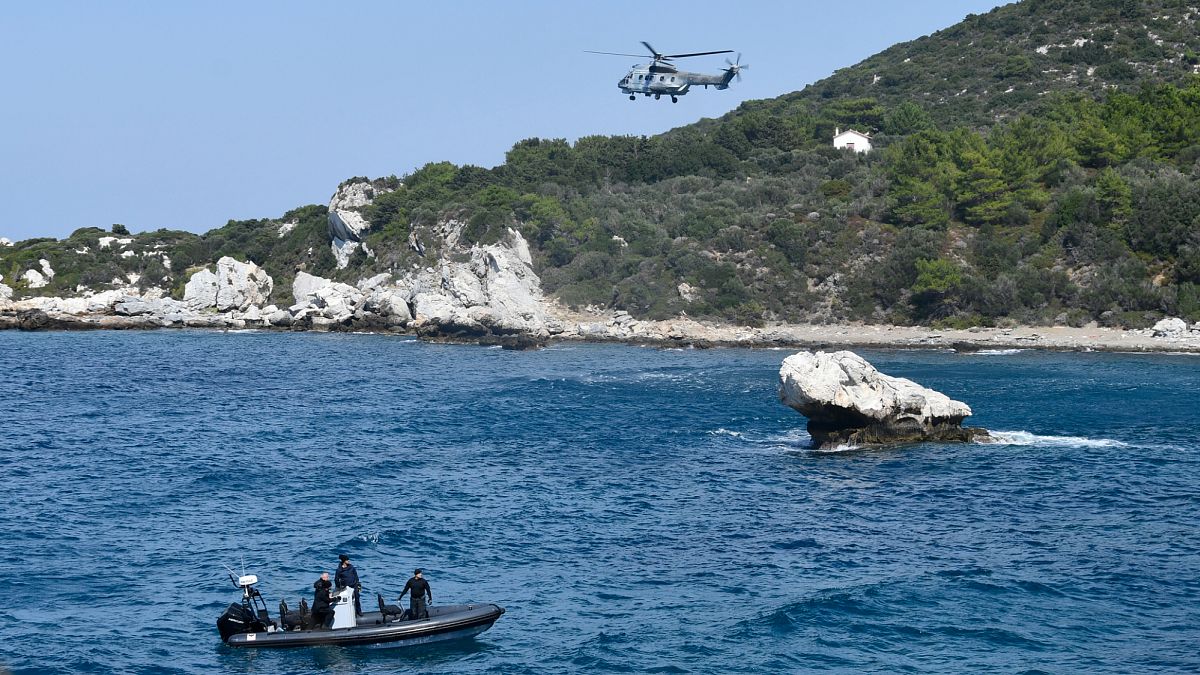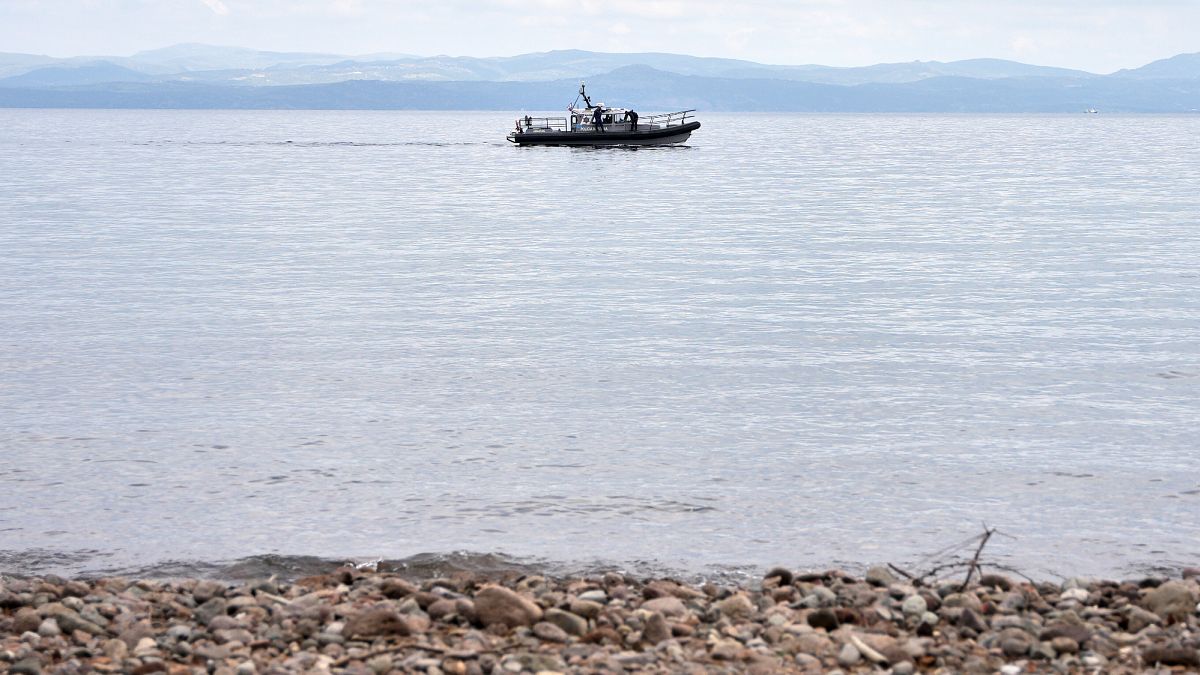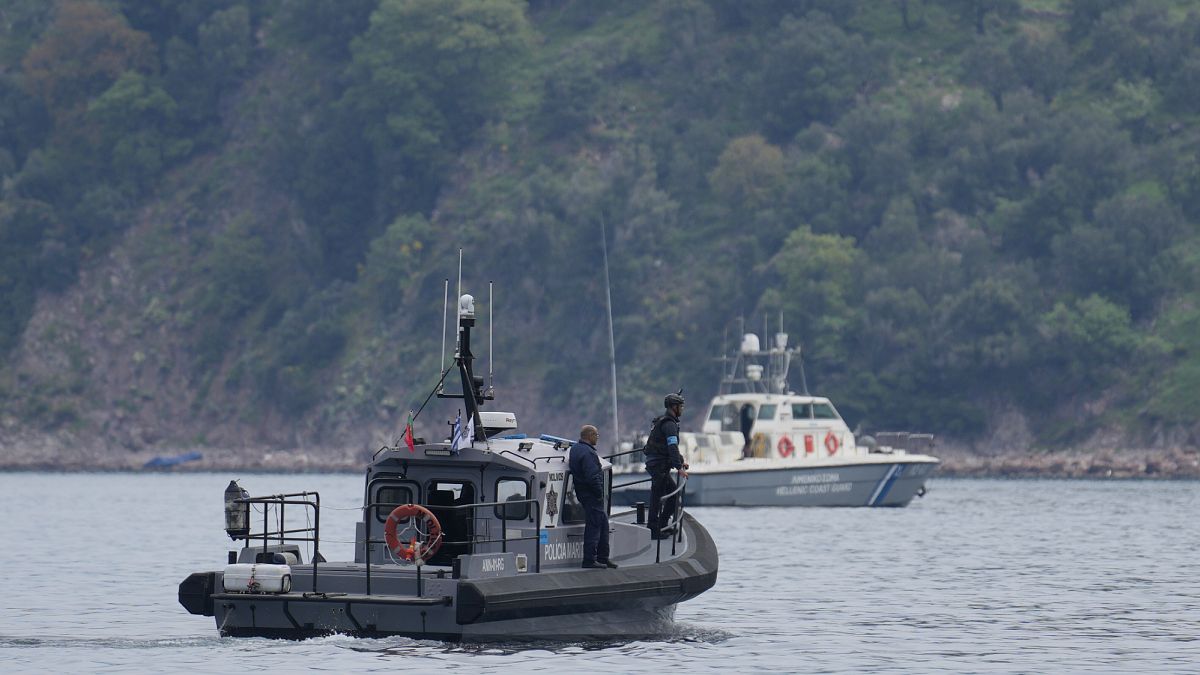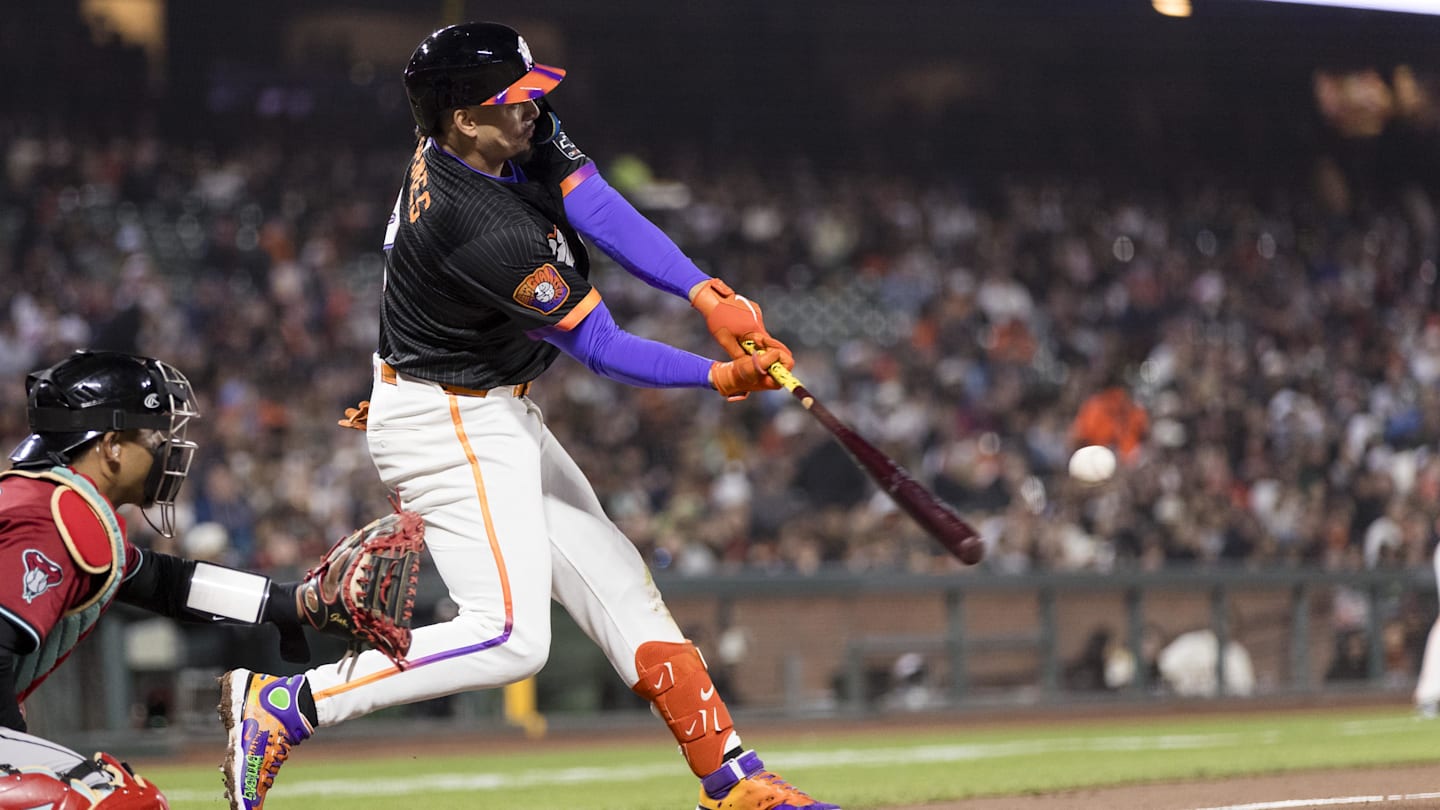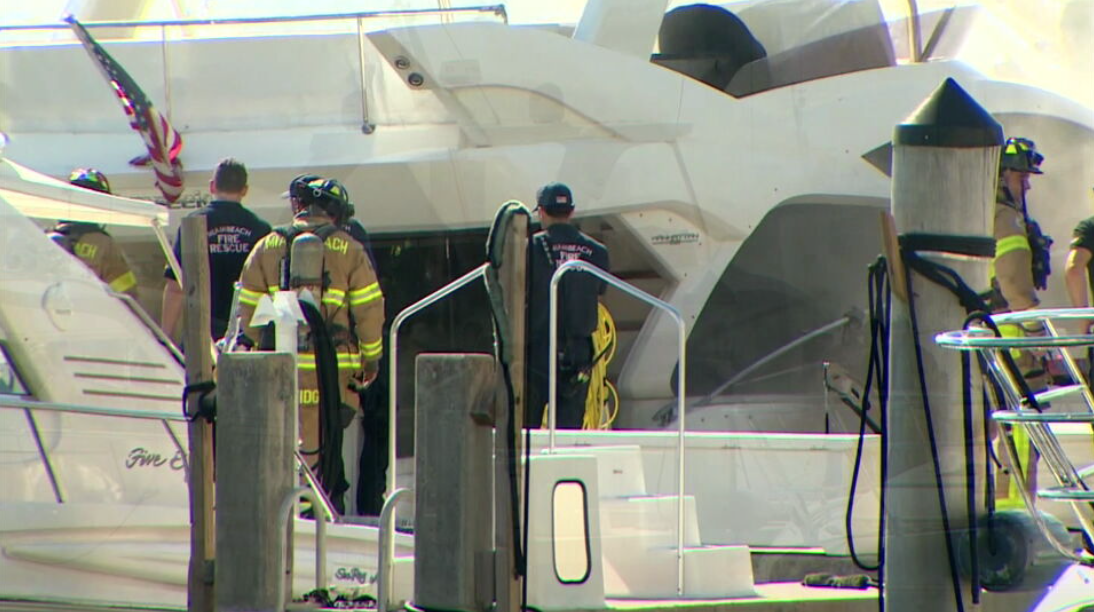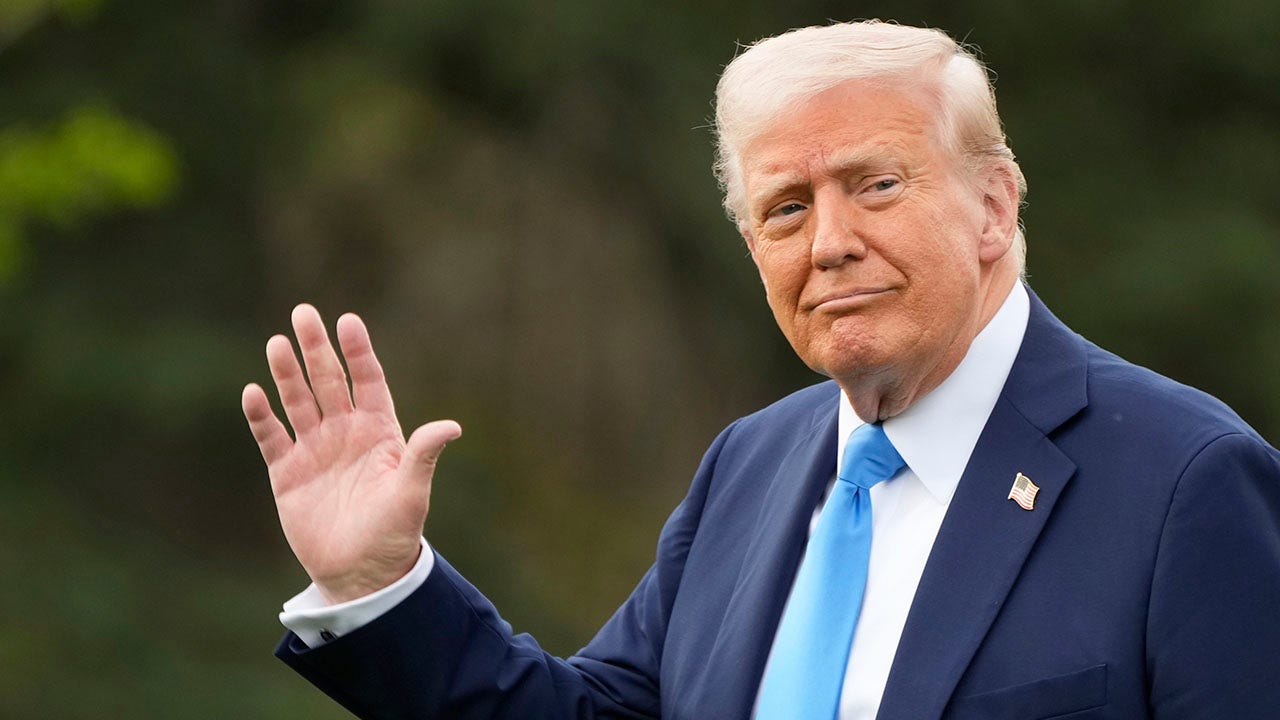World
EU watchdog to investigate Frontex’s role in deadly Adriana shipwreck
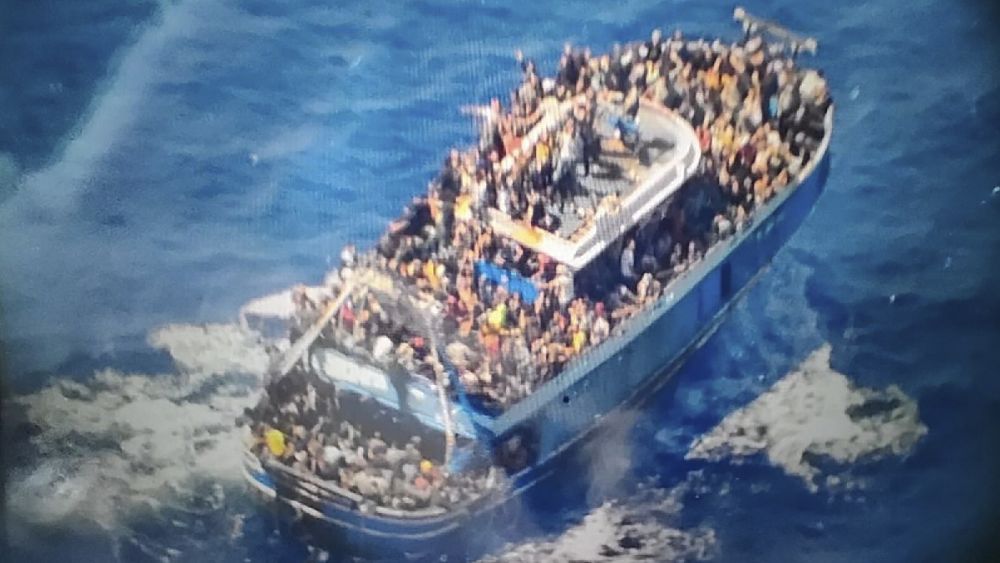
The European Union’s watchdog on Wednesday launched an investigation into the role Frontex played in one of the deadliest migrant shipwrecks in recent history.
Among the documents EU Ombudsman Emily O’Reilly has demanded access to is the formal report by the Union’s external border agency about how events unfolded when the Adriana boat sank on 14 June off the coast of Greece.
Up to 750 people were on board the fishing vessel. Only 104 survived while 82 bodies were recovered.
The tragedy reignited sharp criticism of the Greek coastguard as well as Frontex who are accused of not taking the necessary actions that could have prevented the shipwreck.
Frontex has said it offered assistance to the Greek authorities after the overcrowded boat was spotted but that both calls went unanswered. Greek authorities have meanwhile defended its operation — a single ship was sent but offered no assistance after the captain of the trawler reportedly refused help in order to continue sailing towards Italy.
An investigation has been launched at the national level but O’Reilly said in a statement that “Frontex’s role in search and rescue operation also needs to be clarified.”
“A tragedy of this magnitude requires all those involved to reflect on their responsibilities and to be clear to the public who is accountable for these deaths. My Office will focus on the role of Frontex as we try to piece together the events that led to the capsizing of the boat and the deaths of at least 500 people.”
“Migration to Europe will continue and it is up to the EU to ensure that it acts in a way that maintains fundamental rights and does not lose sight of the human suffering that compels people to seek a better life beyond their home countries,” said the Ombudsman.
Frontex ‘helped rescue 28,000 people this year’
As part of the own-initiative inquiry, O’Reilly is also asking for details about how national authorities and Frontex communicate over search and rescue operations and about the rules for the use of cameras mounted on boats during joint operations. She is also demanding clarification over whether Frontex reports on fundamental rights violations with regard to the interactions of national authorities with NGO vessels that rescue people at sea.
Both the Greek coastguards and Frontex have been accused of violating fundamental human rights in recent years by either carrying out of turning a blind eye to migrant pushbacks at sea.
A report by OLAF, the EU’s anti-fraud agency, that was leaked late last year documented multiple such pushbacks in the Aegean Sea between 2020 and 2021 that were covered up by Frontex.
The scandal led to the resignation of Fabrice Leggeri as Frontex chief with his successor, Hans Leijtens vowing to end the practice when he come into office.
Frontex said in a statement to Euronews that they “look forward to fully cooperating with the Ombudsman to explain the role Frontex plays in search and rescue operations.”
“It is important to note that Frontex does not coordinate search and rescue operations. This is the responsibility of the national rescue coordination centres. Nevertheless, Frontex sees the rescue of lives at sea as one of its essential roles and provides all the necessary support to national authorities when needed.
“This means that Frontex vessels conduct search and rescue operations when called upon. In addition, both Frontex vessels and aircraft provide rescue centres and rescuers with information vital to saving lives.
“Just this year, Frontex helped to rescue nearly 28,000 people”, a spokesperson added.
‘We need to trust national judicial systems’
The Ombudsman office also announced on Wednesday that it will launch a second investigation later this year into the role of EU institutions in upholding fundamental rights in border management activities.
The European Commission has always maintained that border management is a competence of member states and that any possible violation of international and humanitarian law must be carried out by national authorities.
Home Affairs Commissioner Ylva Johansson reiterated this stance during a grilling by the European Parliament’s Justice Committee earlier this month.
Asked whether the EU executive could facilitate an independent and transparent investigation into the June shipwreck, she stressed that “member states are responsible for these kinds of investigations […] we need to trust the judicial system in member states.”
“There is an urgent need for a thorough, transparent and effective investigation, and I agree that this is important for many reasons, not least for the Greek reputation,” she added.
Greek investigations over the last few years into allegations of human rights violations in their handling of migrants have always cleared their agencies of any wrongdoing.

World
Walz calls Trump a 'tyrant' who is trampling Americans' rights and violating the rule of law
Democratic Gov. Tim Walz of Minnesota assailed Donald Trump in a law school graduation speech Saturday, accusing the Republican president of creating a national emergency by repeatedly violating the rule of law.
Walz, the vice presidential nominee in 2024, used his remarks at the University of Minnesota’s law school commencement ceremony to call on graduates to stand up to abuses of power. Lawyers, he said, “our first and last line of defense.”
“Right now, more than any other time in my lifetime, we need you to live up to the oath that you’re about to make. Because, I have to be honest with you: You are graduating into a genuine emergency,” Walz told the crowd, which greeted him with loud applause. “Every single day, the president of the United States finds new ways to trample rights and undermine the rule of law.”
Walz pointed to Trump’s immigration crackdown, which includes deporting alleged gang members to a notorious prison in El Salvador without due process, and the offer of a gifted jet from the Qatari ruling family to the president.
“This is what the crumbling of rule of law looks like in real time. And it’s exactly what the founders of this nation feared: A tyrant, abusing power to persecute scapegoats and enemies,” he said.
Since Kamala Harris’ loss to Trump in November, Democrats have been debating which direction to take the party amid deep frustrations from Democratic voters that its leaders are failing to do enough to check the new administration.
Walz is among a long list of potential 2028 candidates who have been traveling to early voting states.
Others include Illinois Gov. JB Pritzker, who sharply criticized “do-nothing” Democrats last month for failing to oppose Trump. Pritzker, who is scheduled to headline a Minnesota Democratic dinner in June, drew attention in February when he used part of his joint budget and State of the State address to draw a parallel between Trump’s rhetoric and the rise of Nazi Germany.
This past week, President Joe Biden’s transportation secretary, Pete Buttigieg, returned to Iowa for a town hall where he criticized Trump’s administration while demanding that Democrats make their agenda clear and reach out to people who disagree with them.
California Gov. Gavin Newsom has been hosting a high-profile podcast. Vermont Sen. Bernie Sanders and New York Rep. Alexandria Ocasio-Cortez have been drawing huge crowds to rallies across the country. Walz and Gov. Wes Moore of Maryland have scheduled stops in South Carolina at the end of May.
In his commencement speech, Walz acknowledged his words were particularly pointed for a celebratory ceremony.
“Some would say, ’Boy, this is getting way too political for a commencement address.’ But I would argue: I wouldn’t be honoring my oath if I didn’t address this head on,” he said to applause and cheers.
Later, he scoffed at some Democrats who have urged the party to focus on issues such as trade, where Trump is polling badly, instead of the rule of law.
He also attacked “feckless” and “cowardly” big law firms that have acquiesced to Trump in the face of threats, with some offering millions in pro bono work and other benefits.
“It’s a flagrant betrayal of the oath they took as lawyers,” he said, urging graduates to refuse to work for or with those firms as they make their way into the workforce.
World
Grandmother arrested at abortion clinic warns of expanding free speech 'buffer zones'
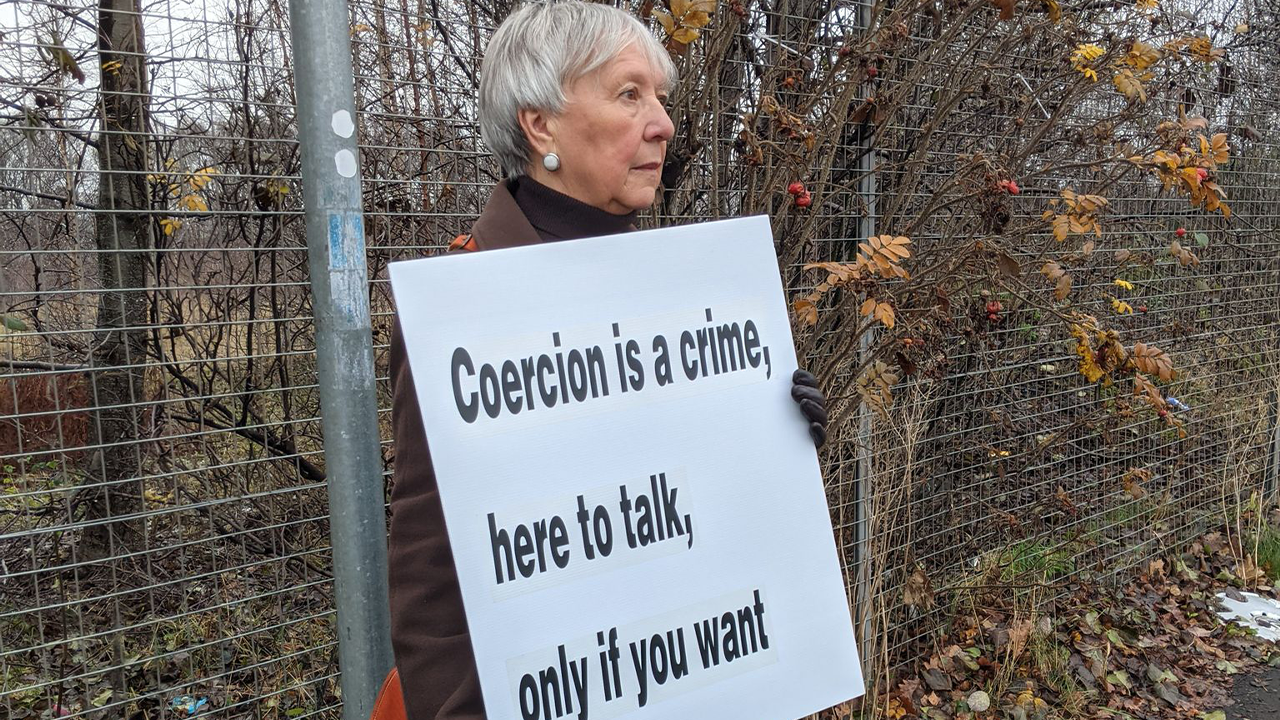
A grandmother in the U.K. who was arrested for holding a sign outside an abortion clinic is sounding the alarm against further attacks on free speech as lawmakers move to expand so-called “buffer zones” outside such facilities.
Rose Docherty, 74, was arrested in Glasgow, Scotland near the Queen Elizabeth University Hospital (QEUH) in February for holding a sign that read: “Coercion is a crime, here to talk if you want.”
Docherty was the first person to be arrested and charged under the Abortion Services (Safe Access Zones) Act, which went into effect in September, the BBC reported.
The law prohibits any protests or vigils from taking place within 200m or 656ft of 30 clinics offering abortion services in Scotland, but the law specifies that the Safe Access Zone could be extended if considered appropriate.
Docherty’s arrest came just days after Vice President JD Vance highlighted the law as an example of free speech being under attack in the U.K.
Rose Docherty, 74, was arrested in Glasgow, Scotland near the Queen Elizabeth University Hospital (QEUH) in February for holding a sign that read: “Coercion is a crime, here to talk if you want.” (Rose Docherty)
UK WOMAN THREATENED WITH FINE FOR PRAYING WITHIN ABORTION FACILITY’S ‘BUFFER ZONE:’ ‘ GROSSLY ORWELLIAN’
Now, Gillian Mackay, the Green Party parliamentarian responsible for introducing the buffer zones legislation, has now suggested that the Scottish government consider expanding the area of prohibition on “influence” outside hospitals, according to ADF International, a Christian legal advocacy group.
Docherty has rejected a formal warning from the Crown Office – arguing that it was “unjust” – and is waiting to find out what action may now be taken against her.
In her first broadcast interview since her arrest, she told the BBC she had “no reason to regret” the incident, noting it was an “alarming” and “surreal” experience.
She said she had read the law and believed her actions did not violate the legislation.
“I gave consideration to what I was doing…I looked at the law and saw what it said I couldn’t do, and thought, OK, well, this is what I can do…I can offer to listen, and if anyone wants to come and speak to me, they can do so, only if they want to come and speak with me,” she told BBC’s Scotcast.
She said she is prepared to go to prison over the offense.
Docherty has also said that the government essentially wants to stamp out any opposition to abortion.
“I believe it wouldn’t matter where we stood…it wouldn’t matter how far they pushed the ‘buffer zone,’” she told ADF International, a Christian legal advocacy group.
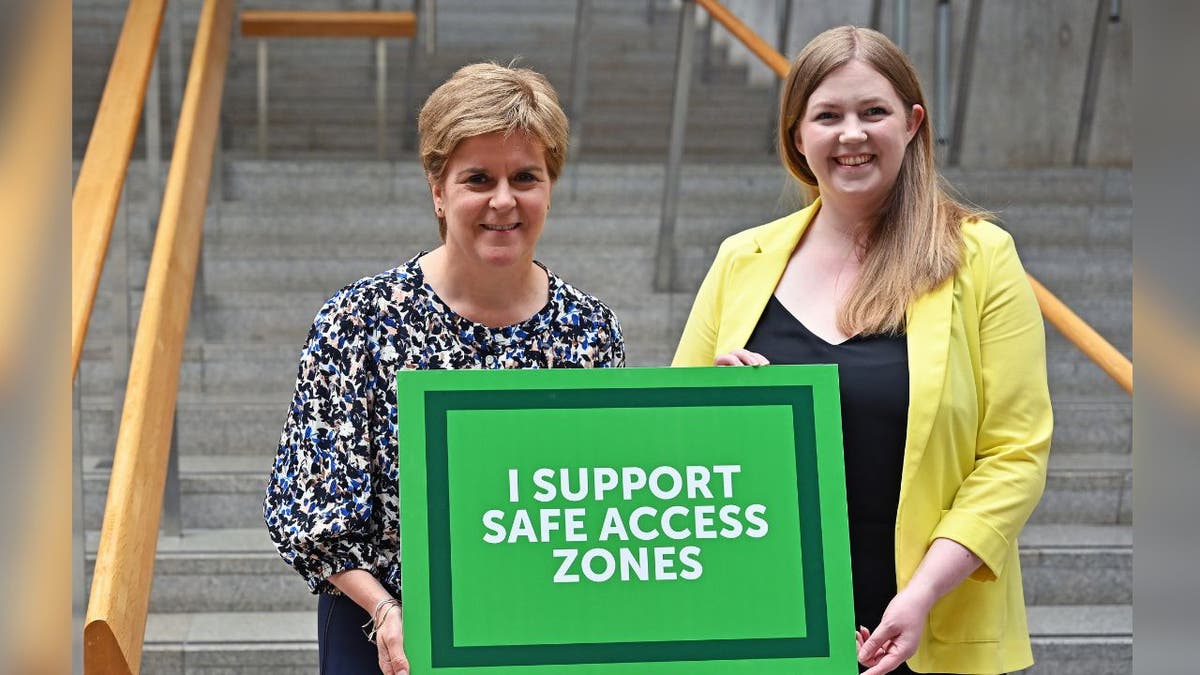
Former First Minister Nicola Sturgeon, left, poses for a photograph with Scottish Green MSP Gillian Mackay, right, in the lobby of the Scottish Parliament, in support of Mackay’s “buffer zones” bill on June 27, 2023 in Edinburgh, Scotland. (Ken Jack/Getty Images)
NEW ONLINE ‘MISINFORMATION’ BILL SLAMMED AS ‘BIGGEST ATTACK’ ON FREEDOMS IN AUSTRALIA
“It wouldn’t matter where we stood –201 meters, or 500 meters away – it seems the authorities would still try to crack down harshly and unfairly on individuals because the government simply disagree with their point of view. This is unjust – of course, there should be laws against harassment, and we all condemn such behavior. But merely offering conversations near a hospital is not a crime.”
Dr Greg Irwin, a doctor at the QEUH, was pictured confronting a group of protesters in February 2023, saying that they “cause emotional upset to patients, but also to staff members,” per the BBC. Groups have been protesting outside the hospital for 10 years, leading to the passing of the Safe Access Zones Act.
Mackay said patients and staff had told her that they still had to pass the protesters when attending the QEUH leading to distress.
“I think it’s appropriate that we take those concerns seriously and the government take a look at whether an extension is appropriate or not,” Mackay told the BBC.
The act allows ministers to extend the size of a buffer zone if it is decided that the existing zone is not adequate, a Scottish government spokesperson told the outlet.
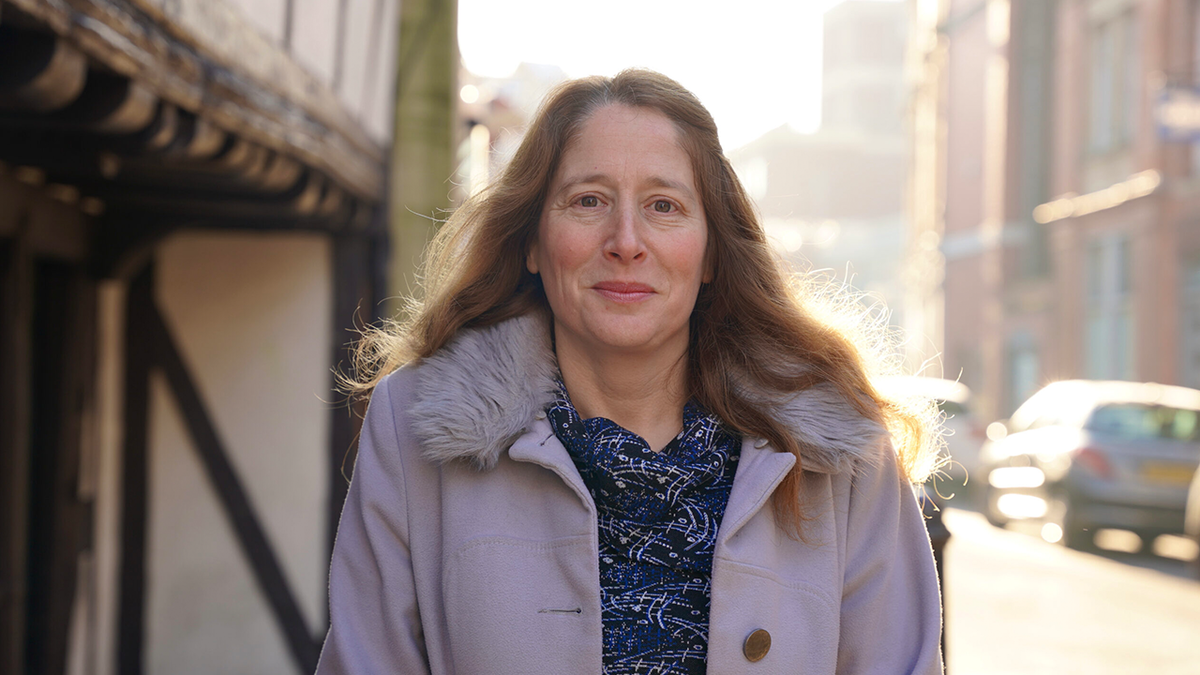
Isabel Vaughan-Spruce was arrested for praying silently outside an abortion clinic in Birmingham, England. (Alliance Defending Freedom UK)
Docherty isn’t the first person to be arrested outside abortion facilities.
For instance, Isabel Vaughan-Spruce, a prominent pro-life activist, was arrested twice in Birmingham for silently praying without any signs near an abortion facility within a buffer zone. She was arrested under a local law known as a Public Spaces Protection Order (PSPO). She was later awarded $13,000 in compensation for wrongful arrests, according to Christian Today.
The U.K. has drawn international attention for its alleged clampdown on free speech. A number of people have been investigated and arrested for social media posts.
World
Tornadoes kill 21 in US states of Missouri and Kentucky

The storms are part of a severe weather system sweeping across the Midwest, leaving thousands without power.
At least 21 people have died after tornadoes caused by severe storms swept through the states of Missouri and Kentucky in the United States, officials said.
Kentucky governor Andy Beshear on Saturday said on X that at least 14 people died in the Friday night’s storms.
At least seven others were killed in Missouri as authorities launched a search for people trapped in buildings.
Kentucky authorities said there were severe injuries when a tornado tore across Laurel County late on Friday. “The search is continuing in the damaged area for survivors,” the office of Sheriff John Root said in a statement posted on social media.
In Missouri, St Louis Mayor Cara Spencer confirmed five deaths in her city and said more than 5,000 homes were affected.
“Our city is in mourning tonight,” she told reporters. “The loss of life and destruction is truly, truly horrific.”
Another tornado struck Scott County, about 209km (130 miles) south of St Louis, killing two people, injuring several others and destroying multiple homes, Sheriff Derick Wheetley wrote on social media on Friday.
“Our first responders acted swiftly, even while the tornado was still active, putting themselves in harm’s way to provide immediate assistance and care to those injured,” he said.

The storms, which began on Friday, are part of a severe weather system that has also spawned tornadoes in Wisconsin, leaving thousands of people without power in the Great Lakes region and bringing a punishing heatwave to Texas.
A dust storm warning was issued around the Chicago area on Friday night. The weather service said a wall of dust extended along a 161km (100-mile) line from southwest of Chicago to northern Indiana that severely reduced visibility.
In Texas, a heat advisory was issued for San Antonio and Austin cities, with temperatures at a blistering 95F (35C) to 105F (40.5C). Parts of the southern East Coast, from Virginia to Florida, also battled with heat in the 90s (32-37C).
The National Weather Service Office for Austin and San Antonio said humidity over the weekend was expected to make temperatures feel hotter.
“There are concerns of heat exhaustion for people that aren’t taking proper precautions when they’re outdoors,” meteorologist Jason Runyen said, advising those affected to take breaks and stay hydrated.
-

 Austin, TX1 week ago
Austin, TX1 week agoBest Austin Salads – 15 Food Places For Good Greens!
-

 Technology1 week ago
Technology1 week agoNetflix is removing Black Mirror: Bandersnatch
-

 World1 week ago
World1 week agoThe Take: Can India and Pakistan avoid a fourth war over Kashmir?
-

 News1 week ago
News1 week agoReincarnated by A.I., Arizona Man Forgives His Killer at Sentencing
-

 News1 week ago
News1 week agoWho is the new Pope Leo XIV and what are his views?
-

 Entertainment1 week ago
Entertainment1 week agoReview: 'Forever' is a sweet ode to first love (and L.A.) based on Judy Blume's novel
-

 News1 week ago
News1 week agoEfforts Grow to Thwart mRNA Therapies as RFK Jr. Pushes Vaccine Wariness
-
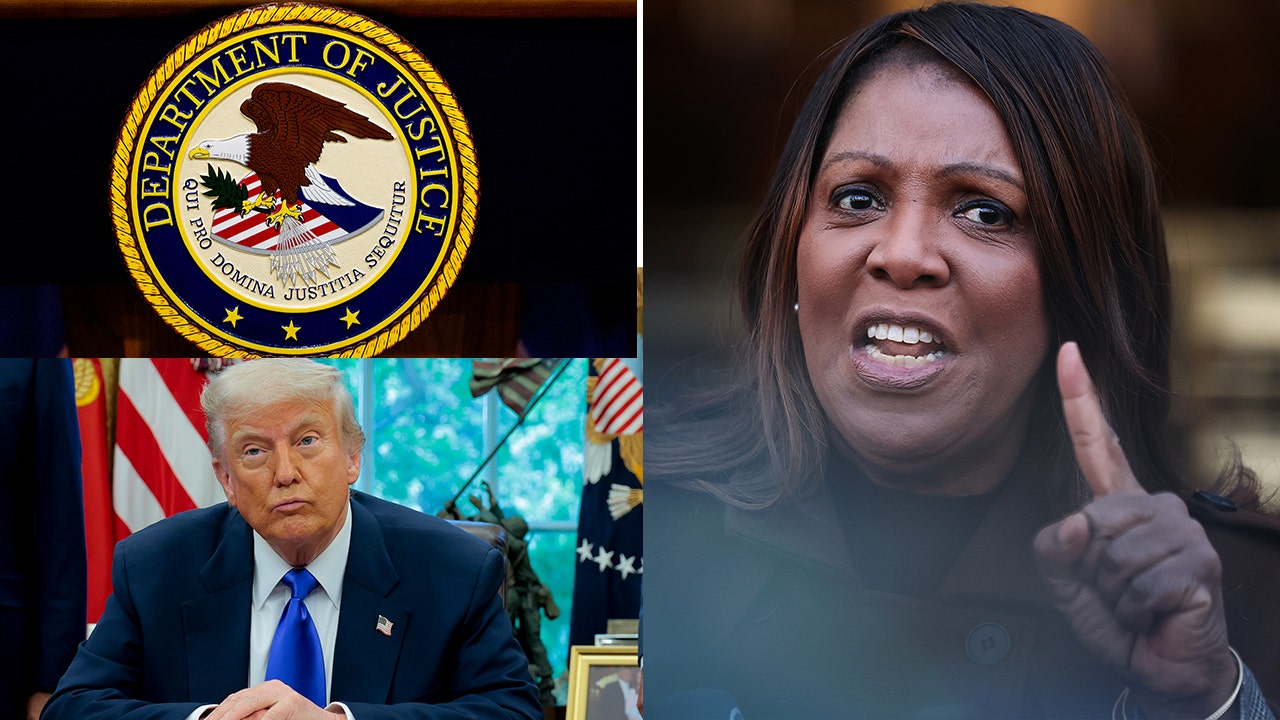
 Politics1 week ago
Politics1 week agoDepartment of Justice opens criminal investigation into NY AG Letitia James


